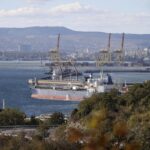A Chinese naval training ship arrived in the Philippines Wednesday for a four-day visit, wrapping up a goodwill tour of four countries in a region increasingly beset by geopolitical tensions.
The 163-meter long Qi Jiguang was welcomed to the Port of Manila’s South Harbor by Philippine Navy cadets who were dressed in crisp whites and waving the flags of each country, while performers danced in traditional dragon costumes.
Chinese Ambassador to Manila Huang Xilian, Chinese student associations and members of various Chinese-Filipino business groups also stood portside to welcome the People’s Liberation Army (PLA) Navy boat.
Conspicuously absent, however, were top officers of the Philippines Navy, in what could be interpreted as a snub amid heightened tensions over territorial claims in the South China Sea.
The last time a Chinese navy vessel made a port call was in January 2019, during then-President Rodrigo Duterte’s pivot to China. China’s Escort Task Group 539 (ETG539), composed of the missile frigates Wuhu and Handan, and the replenishment ship Dongpinghu, conducted a five-day visit to Manila.
This time the Philippine Navy sent only Commodore Carlo Lagasca, the commander of the Littoral Combat Force, to welcome PLA Navy Rear Admiral Su Yinsheng and other Chinese navy officers.
“The Philippine Navy will host the visiting contingent with the customary and usual accommodation it renders to all visiting navies which fulfills its diplomatic role and promotes naval cooperation,” the country’s navy said in a media statement.

The visit comes against a backdrop of more prickly ties between Beijing and Manila. Since taking office in June last year, Philippines President Ferdinand Marcos Jr. has been more vocal in condemning China’s aggressive actions in the region.
China claims nearly all of the South China Sea and has for years militarized artificial islands, while deploying coast guard boats, navy vessels, and a state-backed maritime militia around disputed areas.
The Philippines, Malaysia, Brunei, Vietnam and Taiwan also have overlapping claims in the sea, a maritime lane that sees trillions of dollars’ worth of goods pass through it each year and is rich in natural gas and oil.
Analysts said the port call could be viewed as an attempt by Beijing to flex its soft power in the region.
The 2023 State of Southeast Asia survey conducted by the Singapore-based ISEAS Yusof Ishak Institute showed that nearly half of the respondents do not trust China “to do the right thing to contribute to global peace, security, prosperity and governance.”
Surveys in the Philippines in recent years also showed that Filipinos have little to no trust in China and prefer closer ties with the United States and Australia.
Renato Cruz De Castro, a professor in the International Studies Department at De La Salle University, said it was unclear if this type of visit would change Filipinos’ perception of China.
“This is a mere token Chinese gesture aimed to placate the public sentiment on China,” De Castro told BenarNews on Wednesday.
“As long as China pursues its goal of maritime expansion through its coercive behavior in the West Philippine Sea/South China Sea, this will hardly make any impact on the public’s distrust of this emergent power,” he said.
The West Philippine Sea is the local name given to part of the South China Sea within Manila’s exclusive economic zone.

On Wednesday, BenarNews journalists visited the ship, though the PLA Navy restricted visitors’ movements onboard and prohibited videos and photos. Machine guns, water cannons, and magnetic compasses were among the weapons and equipment on display.
The Qi Jiguang’s visit comes a week after the first-ever trilateral exercises between the coast guards of Japan, the U.S. and the Philippines in the South China Sea.
In April, the Philippine Coast Guard reported that two of its vessels were involved in a close call with Chinese vessels that carried out “dangerous maneuvers” in the South China Sea.
In 2016, an international tribunal ruled in favor of Manila and against Beijing’s expansive historical claims to the South China Sea, but China has since refused to acknowledge the ruling.
The Qi Jiguang, which is carrying 476 crew members, also made stops in Vietnam, Thailand and Brunei.
Source : benarnews.org











